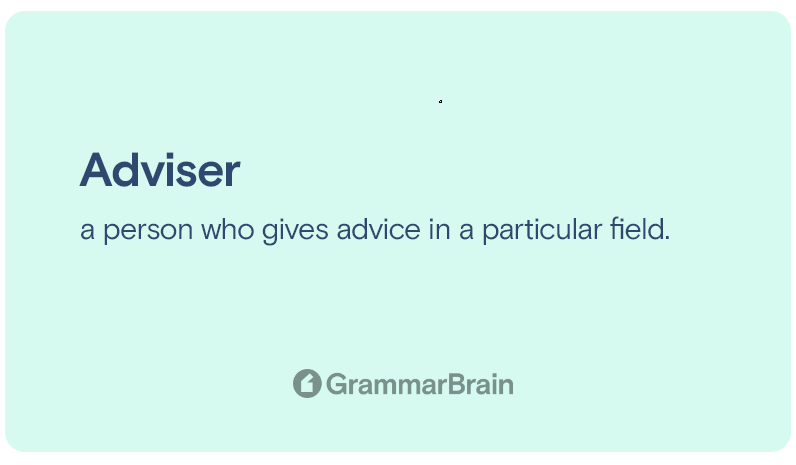Is it ‘advisor’ or ‘adviser’? Do they mean the same, or do they have subtle differences in their meanings and hence, the different spellings? The English language makes us question these nuances a lot, especially when we are on a quest to ensure that we use words correctly.
In reality, adviser and advisor both mean the same and are often used interchangeably in writing.
What is the difference between ‘advisor’ and ‘adviser’?
Used interchangeably, the two words don’t have any differences in their meaning. Both can be when referring to someone who provides some advice.
There can, however, be some differences in their usage and a pattern as to which language groups use which of the variations more predominantly. While both North America and Uk have shown a slight preference towards using ‘adviser’ over the word ‘advisor’, it does commonly appear in official or academic titles.
On the other hand, in most things revolving around the financial or investment-related subject matter — the word ‘adviser’ takes precedence and is seen to occur a lot more frequently. Some examples include — ‘Financial Adviser’ or ‘The Investment Adviser Act.

Meaning of Advisor or Adviser
An advisor or adviser refers to someone who offers some advice or provides counsel. Both are nouns and are widely used. They are also widely accepted spellings of the same word around the globe.
| Word | Definition |
| Advisor (noun) /ədˈvīzər/ | a person who gives advice in a particular field. |
| Adviser /ədˈvīzər/ | a person who gives advice in a particular field. |
Which came first – Advisor or Adviser?
While both spellings date back close to the 1500s in their origin, ‘adviser’ came a tad bit sooner and has been with us longer than ‘advisor’. It has been listed for longer in dictionaries and did come into usage before ‘advisor’
In terms of their entomology, one can figure that out from the ‘-er’ and ‘-or’ suffixes used in words. ‘Advisor’ comes from a Latin past. Hence, its usage is slightly more prominent in academic writing. On the other hand, ‘adviser’ ending in ‘-er’ has German roots and is commonly used in print media.
Both words also equally lend themselves to other words in the English language. The word ‘advice’ retains the ‘e’ from ‘adviser’ while the word ‘advisory’ probably derives its spelling from the word ‘advisor’.
How and when to remember the difference between both words?
By and large, there is not much need to remember the difference between the words as they mean the same, and using them interchangeably is an acceptable practice worldwide. However, it is recommended to adhere to some consistency in writing and pick one spelling you choose to continue throughout your written work.
It is also recommended to use consistency when the words are being used about something already given. For example, when writing about a source or a previous title where the word ‘advisers’ has been used, it might be incorrect to use ‘advisors. In this context, it is considered good writing practice to stick to the word used in the source or title.
Conclusion
English as a language baffles us in many ways. At times like these, it spoils us for choice where two words can mean the same thing and extend the same kind of acceptance. One can use either of the variations as long as one pays attention to the nuances of the writing and adhere to maintaining some form of consistency.
Inside this article
Fact checked:
Content is rigorously reviewed by a team of qualified and experienced fact checkers. Fact checkers review articles for factual accuracy, relevance, and timeliness. Learn more.
Core lessons
Glossary
- Abstract Noun
- Accusative Case
- Anecdote
- Antonym
- Active Sentence
- Adverb
- Adjective
- Allegory
- Alliteration
- Adjective Clause
- Adjective Phrase
- Ampersand
- Anastrophe
- Adverbial Clause
- Appositive Phrase
- Clause
- Compound Adjective
- Complex Sentence
- Compound Words
- Compound Predicate
- Common Noun
- Comparative Adjective
- Comparative and Superlative
- Compound Noun
- Compound Subject
- Compound Sentence
- Copular Verb
- Collective Noun
- Colloquialism
- Conciseness
- Consonance
- Conditional
- Concrete Noun
- Conjunction
- Conjugation
- Conditional Sentence
- Comma Splice
- Correlative Conjunction
- Coordinating Conjunction
- Coordinate Adjective
- Cumulative Adjective
- Dative Case
- Determiner
- Declarative Sentence
- Declarative Statement
- Direct Object Pronoun
- Direct Object
- Diction
- Diphthong
- Dangling Modifier
- Demonstrative Pronoun
- Demonstrative Adjective
- Direct Characterization
- Definite Article
- Doublespeak
- False Dilemma Fallacy
- Future Perfect Progressive
- Future Simple
- Future Perfect Continuous
- Future Perfect
- First Conditional
- Irregular Adjective
- Irregular Verb
- Imperative Sentence
- Indefinite Article
- Intransitive Verb
- Introductory Phrase
- Indefinite Pronoun
- Indirect Characterization
- Interrogative Sentence
- Intensive Pronoun
- Inanimate Object
- Indefinite Tense
- Infinitive Phrase
- Interjection
- Intensifier
- Infinitive
- Indicative Mood
- Participle
- Parallelism
- Prepositional Phrase
- Past Simple Tense
- Past Continuous Tense
- Past Perfect Tense
- Past Progressive Tense
- Present Simple Tense
- Present Perfect Tense
- Personal Pronoun
- Personification
- Persuasive Writing
- Parallel Structure
- Phrasal Verb
- Predicate Adjective
- Predicate Nominative
- Phonetic Language
- Plural Noun
- Punctuation
- Punctuation Marks
- Preposition
- Preposition of Place
- Parts of Speech
- Possessive Adjective
- Possessive Determiner
- Possessive Case
- Possessive Noun
- Proper Adjective
- Proper Noun
- Present Participle
- Prefix
- Predicate



